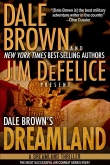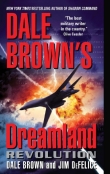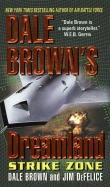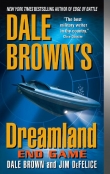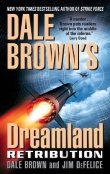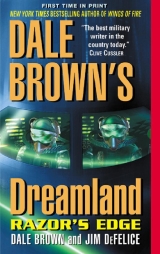
Текст книги "Razor's Edge"
Автор книги: Dale Brown
Жанр:
Боевики
сообщить о нарушении
Текущая страница: 7 (всего у книги 22 страниц)
Danny nodded, following the controller across the parking area toward a set of sandbags where Clark and Sergeant Velis had set up a radio to talk the airplanes in.
Clark grabbed a pair of chemical light sticks and a portable radio, then trotted toward the end of the runway.
He would direct the first plane in to the parking area.
“Hey, Cap! Thanks for letting me work the ’dozer,”
shouted Powder as Danny sat on one of the sandbag piles, the only available seating. “What I’m talkin’ about!”
“I’m surprised you gave it up,” Danny told him.
“Only until the planes land, Cap. Most fun I had with my pants on ever.”
“Yeah, well, keep them on,” said Danny, reaching into his pocket for a candy bar, which was all the dinner he’d have tonight.
Aboard Quicksilver , over southeastern Turkey 1730
“QUICKSILVER READS YOU FINE, HIGH TOP GROUND,” BREE
told the controller as she orbited the freshly meshed field.
“I have a visual on the field. Looks real pretty.”
“Ground acknowledges,” said the controller, all business. “Dreamland Hawk?”
“Dreamland Hawk One reads you fine, High Top ground,” said Zen. Unlike their usual procedure at Dreamland, here the Flighthawk would remain airborne RAZOR’S EDGE
123
until the other planes were down, providing additional protection in case of an attack. While that was unlikely—two flights of fighters were patrolling the sky above and to the south—the apparent loss of two more F-16s over Iraq provided a potent reminder that nothing could be taken for granted.
CentCom had reacted to the loss of the two planes by ordering more retaliatory raids. But they were caught in a catch-22—more raids exposed more planes to danger.
Everyone was on edge, and even the Megafortresses had been challenged by fighter patrols as they flew into south Turkey.
The ground controller turned his attention back to Major Alou and Raven, which was up first in the landing queue. They ran through a quick exchange of vitals about the airstrip, wind, and weather conditions, along with the basic instructions on where the controller wanted him to put the plane once they landed. The exchange was somewhat pro forma, as the Megafortress could compute her own data and adjust accordingly, but the routine itself was comforting. The well-trained CCT on the other end of the radio did his job with the high precision a pilot could appreciate; it boded well if things got complicated down the line.
“Raven on final approach,” said Chris as their sister plane pushed in.
Quicksilver was about a mile away and roughly parallel to the runway, opposite Raven as it settled down. Zen had brought Hawk One into a chase pattern behind and above Raven to feed Alou additional video view if he needed it. Breanna had the feed displayed on her console; she watched as Alou came in a bit high to avoid the rocks at the approach end, then flopped down onto the mesh grid, chutes deployed, thrusters in reverse. Dust spewed as the plane shuddered onto the ground. Raven began 124
DALE BROWN’S DREAMLAND
drifting to the left about ten yards after her wheels hit; Alou held it for the next twenty then seemed to overcor-rect. In the last fifty yards the plane moved sharply back to the left, jerked right, then disappeared beneath a massive cloud of dust and smoke.
“Shit,” said Breanna.
The video veered into the countryside as Zen brought the Flighthawk around quickly. Breanna jerked her attention back to the sky in front of her. The radar plot showed one of the Pave Hawks crossing ahead.
“Hold pattern, all aircraft,” said the controller sharply.
“We’re all right,” said Major Alou. “We’re okay.”
The Flighthawk video showed the dust clearing. The Megafortress had come off the far edge of the runway, clipping its wing against some of the rocks. The ground people were running toward it as Hawk One passed overhead.
“Raven, please hold your pattern,” said the CCT.
“Raven.”
“Going to have to recalculate our fuel,” said Chris Ferris.
Breanna grunted in acknowledgment as she widened their orbit, waiting for the people on the ground to sort things out. Two of Raven’s sixteen tires had blown and the wing had been lightly damaged, but otherwise the plane was fine. No one aboard had been hurt, assuming the pilot’s bruised ego didn’t count.
“My fault,” Alou told Breanna as the Megafortress was rigged to one of the bulldozers so it could be towed off the runway. “The wind kicked up crazy and pulled the drogue chutes. The computer didn’t know how to compensate and I had to fight it. Then the wind kicked out again and I lost the runway. That tooth to the east between the hillsides—it’s like a blowpipe.”
Breanna could imagine. Crosswinds were always a RAZOR’S EDGE
125
complication for any airplane when landing or taking off.
The Megafortress’s main asset was also its greatest weakness—it was an immense and heavy airframe. Sharp gusts of wind on landing could make a pilot’s life difficult even on the best runway.
“I say we dump the chutes,” said Chris.
“I don’t know if we can stop in time without them,”
said Breanna.
“Chop ’em at the tooth.”
They worked the numbers—they’d run off the end of the runway, maybe even the mountain.
“What if we drop the other Flighthawk?”
The lighter load would lessen the plane’s momentum as it landed, making it easier to stop. Still, the computer calculated they’d need another fifty yards without the chutes.
“Burn off more fuel. Dump it even,” said Chris, working the calculations. The most optimistic—which had them running out of fuel during the final approach—left them ten yards too long.
“We can all eject,” joked Breanna.
“Still leaves us ten pounds too heavy,” answered Chris.
“I think we’re better off just losing the computer,” said Breanna. “We’ll figure the chutes will pull us and compensate.”
“I don’t know, Bree. If they couldn’t handle the cross-wind with the computer’s help—”
“The computer routines weren’t set up with the chutes,” said Breanna. She’d made up her mind. “We can cut it lower too, so we don’t put quite as much strain on the tires. I think they lost them on the touchdown. That hurt their steering.”
“I don’t know, Bree.”
“I do. I’ve landed in forty knot winds in an old B-52.
It’ll be easier than that.” She clicked her com setting to 126
DALE BROWN’S DREAMLAND
talk to Zen. “Jeff, we want to lighten our load. Can you launch Hawk Two?”
“What’s the game plan?”
Breanna explained quickly.
“I don’t know, Bree.”
“What don’t you know?”
“You guys are going to land on that postage stamp without any help from the computer?”
She’d expected Chris to object—though highly skilled, her copilot was by nature extremely cautious. But Zen was ordinarily the opposite, and routinely chafed against the computerized autopilot systems that helped him fly the U/MFs—even though he’d helped develop the damn things. If anyone should be in favor of turning off the training wheels, it should be him.
“I can do it with my eyes closed,” she said.
“Your call, Captain,” said her husband.
“Thank you, Major,” she said. “Tell me when you’re ready to fuel Hawk Two. I’d like to top off One as well.”
“Hawk leader acknowledges.”
ZEN CHECKED THE SITREP ON HIS VIEWER, WAITING FOR
Quicksilver to finish its climb to 26,000 feet. Before he started working with the Megafortress fleet, he’d had a typical fighter jock’s attitude toward big planes and their pilots: basically they were airborne trucks, slow and easy to control. But the airborne launches and refuels had taught him to appreciate exactly how difficult a large aircraft could be to control. Its vast weight and wing surfaces, complicated flight systems, and powerful engines made for a complicated minuet. The dancers at the helm had their hands full, even with the sophisticated flight computers that helped control the Megafortress. Landing the big jet on the smooth surface in the shadow of Glass RAZOR’S EDGE
127
Mountain was one thing, landing on this mountaintop metal-covered sand trap quite another.
And Breanna hadn’t fully recovered from her injuries either.
“Want me to fuel and prep Two for launch?” asked Fentress.
“I got it,” said Zen, louder than he’d intended. He worked quickly through the checklist, jumping momentarily into the cockpit of Hawk One, then handing it back over to the computer in its orbit around the airstrip.
Fueled and powered, Hawk Two purred beneath the EB-52’s wing, eager to launch.
“Can I take it?” Fentress asked.
“Sorry,” said Zen, immediately telling Breanna they were set to launch because he didn’t care to debate with his sidekick.
“READY?” BREANNA ASKED CHRIS AFTER THE GROUND
controller gave them the all-clear.
“Ready as I’ll ever be.”
“Engines are yours,” she said. “Like we chalked it up.”
“Gotcha, coach,” said Ferris.
They brought the big plane out of her last leg on the approach pattern, lining up with the runway. They were at an off angle, their nose about fifteen degrees away from a straight-on run. Several simulations on the Megafortress control computer showed this would give them the best handle on the swirling winds.
“Four’s too hot,” Breanna said. She had the power-graph in the configurable HUD, its green bars overshad-owing the rocks as they approached.
“Backing off four, five percent. Seven percent.”
“Five thousand feet,” said Breanna, reading the altitude against the runway, not sea level—which would have 128
DALE BROWN’S DREAMLAND
added nearly seven thousand feet to the total. “On course.”
“Crosswind!” warned Chris. Quicksilver moaned as he said that, the plane lurching slightly to their left as a gust of wind caught them.
“I have it,” she said. “Gear.”
“Gear,” confirmed Chris. The plane shook slightly, her airspeed quickly dropping below 150 knots against the stiff head wind as the landing gear doors opened. Their momentum bled away; within seconds they were no more than three knots over their stall speed, with a goodly distance to go.
“Hold our power,” said Breanna.
“Gear set and locked,” said Chris. “Okay okay okay.”
“Systems,” prompted Breanna.
“Green, we’re in the green, we’re in the green. Jesus—too low, Bree, we’re going to clip the rocks.”
Breanna resisted the impulse to break off the approach and instead held back on her stick ever so slightly longer than she had intended. They did cut the lip of the ridge close, but they cleared it.
“Chutes!” said Breanna and Chris together. They’d timed the deployment down to the millisecond, trying to balance the different effects and maximize the drag without ending up too far off course. The jet wobbled slightly but held herself in the air, the extended trailing edges on the wings adjusted by a series of small actuators that responded in micrometer increments to the pilot’s input.
“Reverse thrust! Reverse!” Breanna shouted.
The swirling gusts suddenly changed direction and died. The Megafortress’s tail threatened to whip out from behind her and the plane rolled faster than she’d wanted, its speed jumping nearly fifty knots, if the speedo were to be believed. Breanna’s fingers compressed around the stick, her soft touch suddenly gone, her biceps cramping.
RAZOR’S EDGE
129
An alarm sounded in the cockpit, and Chris shouted another warning.
Then she did something she’d never done before when landing a Megafortress: She closed her eyes. The plane’s wings seemed to hulk over her shoulders, extensions of her body. Her stomach felt for the runway, her legs dragging the brakes. She fought the muscle knots in her hand and back, pushing the plane as gently as she could, willing it along the path as she’d planned, compensating for the wind, feeling her way dead onto the middle of the runway.
God, she thought. The word filled her head, the only conscious idea. Every other part of her belonged to the plane.
“Holding, holding, oh yeah, oh yeah,” Chris was saying. “Fifty knots. Thirty. Oh mama! Stopping! We’re stopping! This is pretty, Captain!”
Someone behind her started to cheer. Breanna opened her eyes, looking out the windshield of the jet for the ground controller who was supposed to meet them and steer them to their parking slot.
High Top
1800
DANNY FREAH WAITED AS THE HATCHWAY BENEATH THE
Megafortress hissed and began to lower. He jumped onto the steps as soon as they touched the ground. Hopping aboard, he popped up into the Flighthawk control deck, where Zen was busy bringing the U/MFs in for their landings. The major’s new sidekick, Captain Fentress, looked around with a surprised expression, but Zen remained oblivious, hunkered over his controls. Danny waved at Fentress, then clambered up the access ramp to the flight deck, where the crew was just stowing their gear.
130
DALE BROWN’S DREAMLAND
“Nice landing, Bree,” said Danny. “Welcome to the No-Tell Motel.”
“Glad to be here,” she said.
“Colonel Bastian wants to conference,” he told her. “I was hoping I could sit in Quicksilver with you guys when we take it. We don’t have the headquarters trailer down yet, and our only radio is the SatCom.”
“Not a problem,” she said, stepping back as he climbed into the ship. Breanna caught his arm as he reached the deck. “We appreciate your getting that strip together so fast. Thanks.”
It was the first thank-you he’d heard all day, and it felt incredibly good. “Thanks.”
“Now that I’ve brown-nosed you,” added Breanna,
“can I drive one of those bulldozers?”
Dreamland Secure Command Center
1012
DOG PACED BACK AND FORTH ACROSS THE FRONT OF THE
situation room like an anxious father-to-be waiting word from the delivery ward.
He should have found a way to go himself. Nobody had ordered him not to this time—so why hadn’t he even thought of it?
Because he was superfluous. Because his job was here.
Because Major Alou and Breanna were much better Megafortress pilots than he was.
Bree, at least. Alou was still a little new. But the arguments that had kept Cheshire here went triple for him.
Except that he wanted to be out there, in the mix.
Why had he sent Jennifer? Because she knew the computer systems better than anyone in the world, including her boss, Ray Rubeo, who was sitting at one of the nearby RAZOR’S EDGE
131
consoles. Not only had she helped develop half of the avionics in the Megafortress and Flighthawks, but she could probably figure out the rest with her eyes closed.
If he was worried about Jennifer, why wasn’t he worried about his own daughter, Breanna? She was taking much more risk, flying the plane into combat.
Because Breanna had never seemed vulnerable?
Vulnerable wasn’t the right word.
Rubeo sighed loudly, leaning back in his chair. He’d brought a book to read as well as a pile of technical fold-ers, and seemed to flit back and forth between them as if reading them all simultaneously.
Losing two more F-16s—it still had not been confirmed that the planes had been shot down, though everyone assumed they were—had sent CentCom as well as Washington into a frenzy. It didn’t help that no one knew what had shot down the planes. The latest CIA theory was that the Iraqis had managed to acquire modified versions of the Russian Straight Flush radar, a low PFR radar that had been modified not only to frequency skip but to resist jamming. The theory held that they were able to use the radars in conjunction with older but also undoubtedly modified Fan Gong F radars, all of which were turned on for extremely short periods of time in a predetermined pattern. Data from these extremely brief bursts were then used to launch several missiles.
The theory did explain some things, such as the many brief radar indications and the barrage missile launchings. But as Rubeo pointed out, it did not account for the uncanny accuracy of the missiles, most especially since some of them didn’t have their own terminal guidance and those that did should have been defeated or at least confused by ECMs.
Perhaps the guidance systems had been altered. Perhaps the barrage firings increased the relatively poor odds 132
DALE BROWN’S DREAMLAND
of a single missile finding its target. Perhaps the Iraqis were just lucky.
“And perhaps Pooh Bear is God,” Rubeo said.
But a laser also seemed farfetched. If the Iraqis had it, why didn’t they use it on everything in the air?
Whatever it was, the Dreamland team had to find it—and neutralize it.
“Really, Colonel, when are we going to get on with this?” asked Rubeo. “We are wasting time that even at government rates is not inexpensive.” Rubeo frowned and fingered his stubby gold earring. He was brilliant—half the gear in the room had been designed by him or one of the people who worked for him—but Dog thought that sometimes he pushed the eccentric scientist a bit too far.
“What are you reading there, Doc?” asked Dog, trying to change the subject.
“Commentary on Plato. Wrong-headed, but diverting.”
“High Top Base to Dreamland Command.” Major Alou’s voice boomed over the speaker system. “Colonel, do we have a connection?”
Dog turned toward the screen at the front of the room, even though he knew there would be no video; they were using the Megafortresses to communicate. The Whiplash portable command center, with its full suite of com gear, hadn’t even been delivered from the MC-17 yet. “Go ahead, Major.”
“You wanted to speak to us?”
“I have information that may be relevant. We’re going to try to get Jed Barclay on the line to sit in on this.” He nodded at the lieutenant handling the communications, who punched in the commands to connect the NSC secure line. A signal indicated that the line—which had been open just two minutes before—was now unavailable.
“Hi, Daddy,” said Breanna lightly. She sounded like a kid calling from college.
RAZOR’S EDGE
133
“Captain.”
“Weather’s fine, if you like windchills approaching fifty below,” she told him.
“She’s exaggerating,” said Alou. “Windchill only makes it feel like thirty below.”
“Colonel, High Top came through on Channel B, the uncoded backup,” said the lieutenant at the com board. “I can only invoke eight-byte encryption.”
“Well switch it to the secure channel,” said Rubeo, whose tone suggested he considered the lieutenant about as intelligent as an earthworm.
“I’ve tried, sir. I don’t know whether it’s the satellite or something on their end.”
“Oh, just peachy,” said Rubeo, getting up from his console and walking toward the lieutenant.
It was unlikely that the Iraqis could intercept the communications signal, let alone break it. The Russians, on the other hand, were capable of doing both.
“I’m told we’re not secure,” said Dog.
“That is not correct,” said Rubeo. “And from a tactical point of view—”
“Excuse me, Doc, I’m talking here.” Dog gave the scientist a drop-dead frown. He couldn’t tell them about the laser; doing so would risk tipping the Russians off about Razor. “I have a matter that I want you briefed on. I’ll find a way of getting the information to you. In the meantime, we have to fix our communications glitch.”
“I’m working on it,” said the lieutenant.
“How long to fix this?” Dog asked.
“Sorry, sir. I’m not sure.”
Dog looked at Rubeo. The scientist shrugged. “Hours.
Days.”
“Better not be days.” Another thought occurred to him—was the glitch deliberate?
The idea obviously hit Rubeo at the same time.
134
DALE BROWN’S DREAMLAND
“We haven’t been compromised,” said the scientist.
“These are the difficulties inherent in new systems. Believe me, Colonel, it is perfectly safe to proceed.”
Rubeo was undoubtedly correct—and yet Dog couldn’t take that chance. Security at Dreamland had been blown disastrously once before.
Under General Elliott, as it happened.
“What’s up, Colonel?” asked Zen.
“I’m going to send you a visitor, I think,” said Dog, im-provising. “He has a theory I want you to hear about.”
“We’re not going to tell them anything?” said Rubeo.
“We’ve wasted all this time—”
“The line isn’t secure,” said Dog.
“Colonel, please, let me explain a bit about the encryption system we’re using as backup,” said Rubeo. “Once we invoke the key, even though—”
“Dr. Ray is rehearsing his vaudeville act,” said Dog.
“I’m sorry. I can’t explain.”
“At least give them perspective,” added Rubeo. “General Elliott’s assessment of technology has always been overly optimistic.”
“General Elliott?” asked Zen.
“I’m sorry, guys,” said Dog. He walked over to the lieutenant’s console and killed Rubeo’s input line. “I’ll get the information to you.”
“Okay,” said Alou.
“Dream Control out,” said Dog.
“Wait!”
Jennifer’s voice pulled his head back toward the screen.
Still blank, of course.
“How are you, Doc?” he asked.
“I’m kick-ass fine, Colonel. Yourself?”
Dog wrapped his arms around each other in front of his chest. “I’m doing well. Was something up?”
“Just to say hi.”
RAZOR’S EDGE
135
“Yes.” He tightened his arms, squeezing them as if wringing a towel. “Dream Command out.”
A slight pop sounded over the circuit as the feed died, the sort of noise a staticky AM radio might make when the lights were switched on in a distant part of the house.
“The odds, Colonel, of the transmission being intercepted and decoded would surely be measured in range of ten to the negative one hundredth power,” said Rubeo.
“I can’t take any chance on that if we’re discussing Razor,” said Dog.
“We weren’t going to talk about Razor,” said Rubeo.
“Please, Colonel, give me some credit.”
“If I didn’t, I’d have you in front of a firing squad.”
“If you want to question my adherence to security protocols, Colonel, I welcome a formal inquiry.”
“Relax, Doc. Fix this coding thing.”
“I doubt it’s more than a switch in the wrong position,”
said Rubeo.
“Communication pending, sir,” said the lieutenant.
“NSC.”
“Secure?” asked Dog.
“Yes, sir.”
“It’s only the important communications that get screwed up,” said Rubeo.
“Connect,” said Dog.
The screen at the front flashed with color. Dog turned toward it as Jed Barclay appeared in the NSC secure room. His eyes were red and drooping, his hair disheveled even worse than normal. Uncharacteristically, he was wearing a suit that seemed to have been recently pressed, or at least dry cleaned.
“I’m ready,” said Jed. “Sorry for the delay.”
“That’s all right, Jed,” Dog told him. “We ran into some technical problems and we’re going to have to take another approach anyway. What’s the latest?”
136
DALE BROWN’S DREAMLAND
“Someone might suggest Major Smith sign up for some camera lessons. His photos were kind of blurry and the analysts all say inconclusive. The two F-15
shoot-downs clinch it for me, but the CIA’s still holding out.”
“Naturally,” said Rubeo.
“Meantime, we’re reassessing targets,” continued Barclay. “CentCom wants ground action to help the Kurds.
Your orders still stand.”
All of this could have been prevented, Dog thought, if we’d simply nailed Saddam when we had the chance.
Calling off a war simply because a hundred hours had passed—what a wheelbarrow of bullshit.
“Uh, Colonel, I have someplace to get to,” added Jed.
“The director himself will contact you if there’s any change or new developments while I’m, uh, in transit.”
“Just one more thing,” said Dog. “Where is Brad Elliott right now, and can you get me through to him?”
“Uh, that’s two things,” said Jed.
Incirlik
2100
MACK SMITH HAD BEGUN THE DAY WITH HIGH HOPES OF
finding a slot with one of the squadrons flying south.
He’d begun at the top—the F-15C guys flying combat air patrol—and worked his way down. The message was always the same: no room at the inn.
Which was bullshit. Here was, without doubt, the best stinking fighter pilot in the stinking Gulf, the hottest stick on the patch—bona fide, with scalps on the belt to prove it, for chrissakes—and he couldn’t even get a gig pushing A-10s across the lines.
Actually, there were no Warthogs in Turkey, and Mack RAZOR’S EDGE
137
wasn’t sure he could fly them if there were. But he would have jumped at the chance. Hell, he’d have taken the copilot’s seat in a Piper Cub if it meant getting into the action.
But nada. Stinking nada. Without exception, the idiot wing and squadron and section commanders, even the stinking D.O.’s and the intel guys and the maintenance people, for cryin’ out loud—every stinking anybody with any sort of authority had it in for him.
Probably they were scared he’d hog all the glory.
Jerks.
Elliott was sequestered in some hotel somewhere with the CIA jerks. Mack ended up wandering around the base, looking for something, anything, to do. He finally found himself staring at CNN in an Army psyops office that was being shared with USAFSOC. The SOC guys were out, the psyops people were off planning their head-shrinking stuff, and Mack was left alone to view a succession of correspondents in Saudi Arabia talk about a situation they knew absolutely nothing about. Reports of bomb strikes were attributed to reliable sources speaking on condition of anonymity. None of what they said was wrong—they just didn’t know what was going on.
But they were a lot better than the talking heads. One civilian expert talked about how “potent” the high-altitude SA-3 missile was and how it was likely the reason the F-16 had been shot down. In Mack’s opinion, the SA-3 was a fairly decent little weapon in its day, and no piece of explosive that could move through the air at three times the speed of sound could be taken for granted.
But it was a medium-altitude missile, designed more to stopgap the vulnerabilities of the SA-2, and at least arguably more effective at 1,500 feet than at 35,000. And hell—the Israelis had befuddled the damn things in the 1973 Yom Kippur War. You couldn’t ignore the stinkers, 138
DALE BROWN’S DREAMLAND
but there were a lot more gnarly problems over Iraq, that was for damn sure.
Like SA-2s? Talk about a weapon system that had been thoroughly compromised. So how had it nailed three F-16s and two F-15s?
No way. General Elliott had to be correct. It had to be a Razor, or a close proximity.
How would he fly against it? he wondered.
He’d taken a few turns as a sitting duck against Razor during its development; he could go on that. Clouds de-creased the laser’s efficiency, so that was the first thing to look for. It didn’t operate in bad weather.
There was some sort of latency thing; it had to warm up between bursts. So you sent out decoys, got it to target the ghost, then nailed the sucker while it recharged or recalibrated or whatever the hell it was lasers did.
Mack got up off the couch as CNN went to a commercial and walked down the hallway in the direction of the squadron commander’s suite. He got about halfway there before an airman caught up to him from behind.
“Captain Smith—”
“That’s Major Smith, kid,” Mack told the airman, who stood about five-four and was thinner than a cherry tree.
“Sorry, sir,” said the airman, so flustered he proceeded to salute. “Sir, General Elliott, uh, retired General Elliott, he’s looking for you. He’s in Colonel Witslow’s office, back this way.”
Everybody on the damn base has it in for me, Mack thought as he stomped through the hallway. He found Elliott buttoning a parka in Witslow’s office.
“Ah, there you are Mack. Grab some flight gear, we’re going for a ride.”
“No shit, General, great,” said Mack, relieved that he finally had something to do. “Where to?”
“To the mountains. The official name is Al Derhagdad, RAZOR’S EDGE
139
but they’re calling it High Top. You’ll see some old friends.”
“We taking a helicopter?”
“There are none available till morning, and I’d like to get out there right now.”
“Hell, let’s grab our own plane,” said Mack, instantly fired up. If they borrowed an F-15E Strike Eagle, he’d be able to wangle into one of the mission packages for sure.
“My thought exactly,” said Elliott. “There’s an OV-10
Bronco with our name on it out on the tarmac.”
“A Bronco?”
The Bronco was an ancient ground support aircraft once used by the Air Force and Marines. Diving with a tailwind, it might break 300 knots.
Might.
“You’ve flown one, haven’t you?” added Elliott.
“Uh, sure,” said Mack. He wasn’t lying, exactly—the Marines had had a few in the Gulf, and he’d hopped aboard one for a familiarization flight just before the start of the ground war. He’d gloved the stick for perhaps five minutes.
“If you’re rusty, we can find someone else,” offered the general.
“No, sir, I can handle it,” said Mack quickly. He could fly anything. “Marines still using them for covert insertions?”
“Actually, this aircraft belongs to Thailand and was en route to an air show in Cairo, where it was going to be sold. The Thais seem to think they might get a better offer from an unnamed American company that I happen to be slightly affiliated with.” Elliott didn’t even hint at a smile.
“We’re going to take it for a test drive.”
140
DALE BROWN’S DREAMLAND
High Top
2205
DANNY FREAH SQUATTED BEHIND THE ROCK AS BISON GOT
ready to ignite the charge. It had started to rain ten minutes before; the wind whipped the drops against the side of his face like pellets of dirt.
“Ready!” shouted Bison. “Clear the area!”
“Bison, only you and I are out here,” Danny told the demolitions man.
“Yes, sir. Clear the range!”
“Clear.”
Bison pushed the button on his remote detonator. The ground shook slightly, and dust spun up from the cliffside just out of range of the halogen spots. Danny got up and walked toward the ridge obstructing the end of the runway; the charges had loosened more stone, but most of the stubborn mountain had refused to yield.
“This is a bitch fuck,” said Bison, cupping a cigarette in his hands to light it. “We’re gonna have to blow it again.”
“Let’s check it first. We got a few feet off,” said Danny.
“Inches maybe.”
Bison’s estimate was probably nearer the mark, Danny realized. The runway wasn’t going to get much longer without considerable effort, nor were they going to be able to knock down the approach. But at least the loose rocks would give his guys more to do. Guard duty was already starting to wear thin, and they hadn’t been on the ground twelve hours yet. He’d have to find them something real to do once they got bored playing with the bulldozers.
A half-dozen medium-size tents had been set up, along with two large ones that were supposed to serve as mess and an auxiliary headquarters. The Whiplash Mobile Command Headquarters—the trailer—had been brought in on the MC-17 and was now fully operational, except RAZOR’S EDGE

